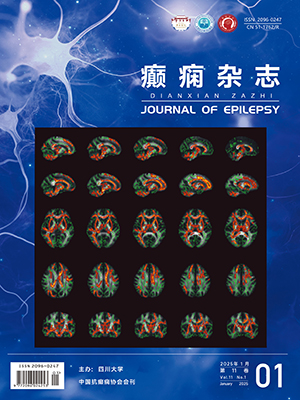| 1. |
Paul M, Bakaki, Siran M, et al. Defining incident cases of epilepsy in administrative data. Epilepsy Res, 2013, 106(1-2): 273-279.
|
| 2. |
Panksepp J, Panksepp JB. Toward a cross-species understanding of empathy. Trends Neurosci, 2013, 36(8): 1016-1024.
|
| 3. |
Panksepp JB, Lahvis GP. Rodent empathy and affective neuroscience. Neurosci Biobehav, 2011, 35(6): 1864-1875.
|
| 4. |
Richter D, Kunzmann U. Age differences in three facets of empathy: Performance-based evidence. Psychol Aging, 2011, 26(1): 60-70.
|
| 5. |
Jones AL, Cascino GD. Evidence on use of neuroimaging for surgical treatment of temporal lobe epilepsy: a systematic review. JAMA Neurol, 2016, 73(4): 464-470.
|
| 6. |
de Vries EE, van den Munckhof B, Braun KP, et al. Inflammatory mediators in human epilepsy: a systematic review and meta-analysis. Neurosci Biobehav Rev, 2016, 15(2): 177-190.
|
| 7. |
Gul A, Ahmad H. The relationship between dispositional empathy and prefrontal cortical functioning in patients with frontal lobe epilepsy. Pak J Med Sci. 2017, 33(1): 200-204.
|
| 8. |
Shamay-Tsoory SG, Aharon-Peretz J. Dissociable prefrontal networks for cognitive and affective theory of mind: a lesion study. Neuropsychologia, 2007, 45(13): 3054-3067.
|
| 9. |
Shamay-Tsoory SG, Aharon-Peretz J, Perry D. Two systems for empathy: a double dissociation between emotional and cognitive empathy in inferior frontal gyrus versus ventromedial prefrontal lesions. Brain, 2009, 132(3): 617-627.
|
| 10. |
Blumcke I, Thom M. The clinicopathologic spectrum of focal cortical dysplasias: a consensus classification proposed by an ad hoc Task Force of the ILAE Diagnostic Methods Commission. Epilepsia, 2011, 52(1) : 158-174.
|
| 11. |
Bromley RL, Baker GA. Fetal antiepileptic drug exposure and cognitive outcomes. Seizure, 2017, 44(2): 225-231.
|
| 12. |
Berg AT, Berkovic SF, Brodie MJ, et al. Revised terminology and concepts for organization of seizures and epilepsies: report of the ILAE Commission on Classification and Terminology 2005-2009. Epilepsia, 2010, 51(4): 676-685.
|
| 13. |
Kalbe E, Schlegel M, Sack AT, et al. Dissociating cognitive from affective theory of mind: a TMS study. Cortex, 2010, 46(6): 769-780.
|
| 14. |
Lev-Ran S, Shamay-Tsoory SG, Zangen A, et al. Transcranial magnetic stimulation of the ventromedial prefrontal cortex impairs theory of mind learning. Eur Psychiatry, 2012, 27(4): 285-289.
|
| 15. |
Pfeifer JH, Iacoboni M, Mazziotta JC, et al. Mirroring others' emotions relates to empathy and interpersonal competence in children. Neuroimage, 2008, 39(4): 2076-2085.
|
| 16. |
Decety J. The neurodevelopment of empathy in humans. Developmental Neuroscience, 2010, 32(4): 257-267.
|
| 17. |
Moyers TB, Houck J, Rice SL, et al. Therapist empathy, combined behavioral intervention, and alcohol outcomes in the COMBINE research project. J Consult Clin Psychol, 2016, 84(3): 221-229.
|
| 18. |
Dziobek I, Rogers K, Fleck S, et al. Dissociation of cognitive and emotional empathy in adults with Asperger syndrome using the Multifaceted Empathy Test (MET). J Autism Dev Disorder, 2008, 38(3): 464-473.
|
| 19. |
Harari H, Shamay-Tsoory SG, Ravid M, et al. Double dissociation between cognitive and affective empathy in borderline personality disorder. Psychiatry Research, 2010, 175(3): 277-279.
|
| 20. |
胡颖, 汪凯. 原发性癫痫患者共情能力的研究. 中华神经科杂志, 2014, 47(8): 528-533.
|
| 21. |
Horan WP, Jimenez AM, Lee J, et al. Pain empathy in schizophrenia: an fmri study. Soc Cogn Affect Neurosci, 2016, 11(5): 783-792.
|
| 22. |
Maurage P, Lahaye M, Grynberg D, et al. Dissociating emotional and cognitive empathy in pre-clinical and clinical huntington's disease. Psychiatry Res, 2016, 237: 103-108.
|
| 23. |
Gilliam F. Social Cognition and epilepsy: understanding the neurobiology of empathy and emotion. Epilepsy Curr, 2015, 15(3): 118-119.
|
| 24. |
Gianina Toller. Neuropsychologia: Right front-limbic atrophy is associated with reduced empathy in refractory unilateral mesial temporal lobe. Neuropsychologia, 2015, 78(11): 80-87.
|




